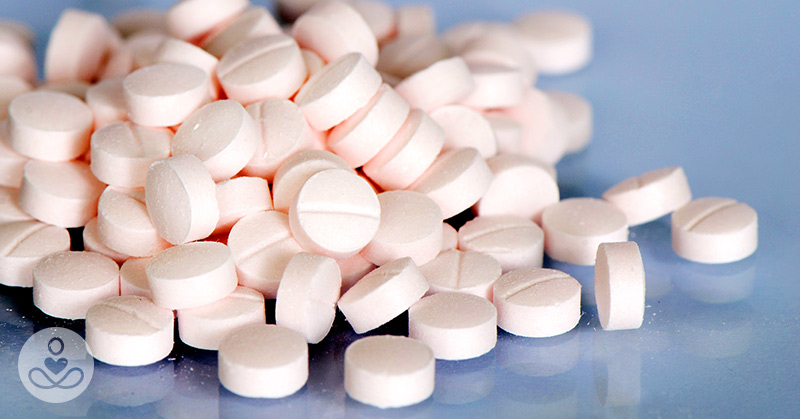This article was originally published on May 23, 2019, and has since been updated.
A study on the effects of aspirin has found alarming results. It’s quite common for older people at risk of heart disease and stroke to take low-dose aspirin (aka baby aspirin) as a blood thinner to reduce the risk of an emergency situation. However, recent research has found this drug may cause bleeding in the skull for those on this treatment path.
Although it’s an accepted practice to take low-dose aspirin to prevent these conditions, these recently discovered risks may outweigh the benefits.
The Trial: Aspirin vs. Placebo
Researchers took data from 13 studies, which included over 130,000 participants ranging in age from 42 to 74. These participants had no history of heart disease or stroke. They were split into two groups; one was given a low dose of aspirin to prevent these conditions, and the other was given a placebo. A low dose can be defined as anything from 75 to 100 milligrams of acetylsalicylic acid (aspirin). However, most over-the-counter low-dose tablets are 81mg. In general, aspirin dosages can range from 50mg to 6000mg, depending on why it’s being used.
The results seemed to confirm the researchers’ suspicions. Those in the placebo group were at a 0.46% higher risk of bleeding in the head during the trial. The other group who took a low dose of aspirin was at the risk of 0.63%. That is the statistic equivalent of 2 out of every 1,000 people developing this form of bleeding. The participants who were most at risk came from Asian backgrounds and/ or had a low body mass index. [1] While this may not seem like a lot, when you extrapolate this to a larger population, the number of people who can be affected is concerning.
This type of head bleeding is clinically known as a cerebral or intracranial hemorrhage. Because oxygen cannot be supplied to the brain during this rupture, it can quickly cause brain damage.
Some of its main causes include:
- Head trauma from injuries
- High blood pressure
- Blocked arteries (which cause strokes)
- Smoking and excessive alcohol consumption
- Treatment with anticoagulant therapy (blood thinners)
People familiar with the symptoms of strokes may recognize the signs of intracranial hemorrhage:
- Sudden tingling, numbness, weakness, or paralysis on one side of the body
- Severe headaches
- Difficulty swallowing or seeing
- Loss of balance and coordination
- Difficulty speaking and cognition
- Sudden lethargy or sleepiness [4]
Aspirin: The Recommended Blood Thinner
Aspirin has become a common drug prescribed for older people with—or at risk of—heart and blood conditions because of its ability to prevent platelets from clotting.
Clotting is a natural healing function but can be harmful to those with a buildup of fatty deposits in their arteries, also known as atherosclerotic plaques. This plaque can become fragile and rupture, triggering the body’s clotting mechanism, which blocks blood flow.
This obstruction to the heart or brain can be fatal. Lack of blood flow to the heart results in a heart attack. Lack of flow to the brain causes a stroke. For those with a history of these conditions, aspirin may be beneficial as a blood thinner, which prevents these clots from forming. [2]
Should We Still Use Aspirin or Not?
After the results of studies like these, aspirin is losing its status as the go-to preventative treatment for those without existing heart disease or who are at a higher risk to have one. Further guidelines were announced last month by the American College of Cardiology. [3]
“Clinicians should be very selective in prescribing aspirin for people without known cardiovascular disease,” says Dr. Roger Blumenthal, a Johns Hopkins cardiologist. “Aspirin should be limited to people at the highest risk of cardiovascular disease and a very low risk of bleeding.” [5]
Blumenthal suggests patients should work with their health care practitioners to evaluate their risk of head bleeding. A person’s risk could increase with:
- Aging
- Kidney disease
- Heart disease
- Diabetes
- High blood pressure
- Ulcers
- Bleeding in the gastrointestinal tract
- Anemia
- Taking certain medications, such as:
- other nonsteroidal anti-inflammatory drugs
- steroids
- direct oral anticoagulants
- warfarin (a blood thinner) [6]
Although it is now being discouraged for healthy people to take aspirin as a preventative for heart disease and strokes, it’s important to talk to your health care practitioner before starting or stopping any medication.
As Blumenthal says, “It’s much more important to optimize lifestyle habits and control blood pressure and cholesterol as opposed to recommending aspirin.”
Sources
- Frequency of Intracranial Hemorrhage With Low-Dose Aspirin in Individuals Without Symptomatic Cardiovascular Disease https://jamanetwork.com/journals/jamaneurology/article-abstract/2732929
- What are Heart Disease and Stroke? https://www.heart.org/-/media/data-import/downloadables/pe-abh-what-are-heart-disease-and-stroke-ucm_300313.pdf
- 2019 ACC/AHA Guideline on the Primary Prevention of Cardiovascular Disease https://www.acc.org/latest-in-cardiology/ten-points-to-remember/2019/03/07/16/00/2019-acc-aha-guideline-on-primary-prevention-gl-prevention
- Intracranial Hemorrhage, Cerebral Hemorrhage and Hemorrhagic Stroke https://my.clevelandclinic.org/health/diseases/14480-intracranial-hemorrhage-cerebral-hemorrhage-and-hemorrhagic-stroke
- Aspiring and Heart Disease https://www.heart.org/en/health-topics/heart-attack/treatment-of-a-heart-attack/aspirin-and-heart-disease
- Epidemiology, Risk Factors, and Clinical Features of Intracerebral Hemorrhage: An Update https://www.ncbi.nlm.nih.gov/pmc/articles/PMC5307940/

